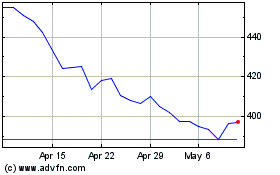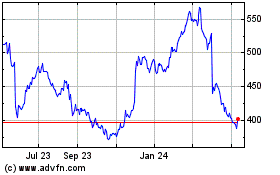By Jean Eaglesham and Nina Trentmann
After its business was hit by the pandemic, retailer Ulta Beauty
Inc. appears to have used some accounting cosmetics to add a gloss
to its financial results.
Operating income at the once-fast-growing chain, which
temporarily closed stores during the health crisis, plummeted to
$13 million for the nine months through October, a fraction of the
$613 million earned in the same period in 2019. Two
coronavirus-related items affected the math: a $40 million
impairment charge for the value of some stores that reduced the
operating income, and $51 million of federal tax credits that
increased it.
Ulta also reported a much healthier $98 million "adjusted
operating income." This tally, designed to strip out one-time
items, added back the $40 million impairment cost, which boosted
the adjusted number, but didn't take off the $51 million of federal
aid. If that aid had been removed, the adjusted-operating-income
number would have been half of what the company reported.
About a year into the pandemic, regulators are ramping up their
scrutiny of potentially misleading coronavirus disclosures by
companies. A senior Securities and Exchange Commission official
warned in December that companies should be consistent in positive
and negative adjustments when showing the impact of the
pandemic.
An Ulta Beauty spokeswoman denied cherry-picking data to flatter
the adjusted metric. She said the impairment cost was a legitimate
one-time charge caused by the impact of Covid-19 on some stores,
not a direct cost of the pandemic such as cleaning supplies.
An SEC spokeswoman declined to comment.
About one in three companies put a dollar amount related to the
impact of the coronavirus in their earnings for the quarter that
ended in December, according to a review of 199 filings from
S&P 500 companies by data provider Calcbench. The financial
pain inflicted includes everything from reduced revenues to
increased bad debts, impaired assets and restructuring costs. On
the plus side, several companies reported savings on travel and
trade-show expenses, the review found.
While metrics that don't follow generally accepted accounting
principles, or GAAP, have been criticized, they can be used to help
investors disentangle the financial effect of what companies
consider a one-time event from the performance of the underlying
business.
American Airlines Group Inc. racked up an $8.9 billion net loss
last year and a non-GAAP net loss excluding special items that --
unusually for this measure -- came in even wider at $9.5
billion.
Like Ulta, the airline added back into its adjusted metric
coronavirus costs, in this case some $3 billion, and federal
pandemic aid, which totaled about $4 billion.
The SEC doesn't dictate how companies report coronavirus costs
and income. But the agency says companies must ensure comments on
the effects of the pandemic are accurate and not misleading.
Restaurant chain Cheesecake Factory Inc. agreed in December to
pay $125,000 to resolve SEC civil charges it misled investors last
spring by saying its locations could continue to operate, when it
estimated it only had about four months' worth of cash left. A
spokeswoman for Cheesecake Factory, which didn't admit the SEC's
findings in its settlement, declined to comment.
One area of Covid-19 accounting that the SEC said it would
scrutinize closely is any changes to revenue to compensate for
losses because of the health crisis.
Uber Technologies Inc. spent tens of millions of dollars last
year to help its drivers and others affected by the pandemic. The
ride-hailing company added back this coronavirus cost in an
adjusted-net-revenue figure, boosting the number. As the company
had always done, however, the adjustment also stripped out a
measure called excess driver commissions, leaving the adjusted $8
billion tally for the nine months through September lower than the
$8.9 billion GAAP revenue figure.
Uber stopped quoting an adjusted net revenue in fourth-quarter
and full-year results earlier this month. An Uber spokesman
declined to comment.
Another bugbear of regulators and investors is companies that
exclude one-time coronavirus costs quarter after quarter, or try in
other ways to use the pandemic as cover to remove some regular
expenses from their non-GAAP numbers.
David Knutson, vice chair of the Credit Roundtable, which
represents institutional investors, said the longer the pandemic
continues, the harder it will become for companies to single out
one-time costs and effects caused by Covid-19. "I think there will
be a fraction of companies still clinging to this excuse," Mr.
Knutson said, adding that companies should be used to operating
under Covid-19 by now.
The SEC in December questioned Puerto Rico-based Oriental Bank
over an adjusted-net-income measure that stripped out "additional
provision for credit losses due to Covid-19." The agency asked in a
letter to Oriental's owner, OFG Bancorp, how it was differentiating
expected credit losses caused by the pandemic from other credit
losses.
OFG agreed in its response to drop the metric and the SEC closed
its review, the filings show. A spokesman for OFG declined to
comment.
Many companies aren't putting dollar numbers on the pandemic's
impact, an analysis of earnings shows.
Roughly one-quarter of S&P 500 companies last year reported
an adjusted figure for earnings before interest, tax, depreciation
and amortization, or Ebitda. But only about one in 10 of those
companies disclosed adjusted Ebitda because of Covid-19 during the
three quarters through December 2020, according to data provider
MyLogIQ.
Jay Knight, a member of law firm Bass Berry & Sims PLC and
former SEC counsel, said it isn't surprising so few companies are
doing coronavirus adjustments "just because it's so difficult to
quantify some of these items."
Another possible reason: Many companies might not feel under
shareholder pressure to dress up the impact of the coronavirus by
using alternative numbers. Earnings have broadly held up well and
most stocks are up. In contrast to hits to profits that might be
the company's fault, executives generally don't need to explain
away the effects of the health crisis.
The SEC is pushing for companies that exclude pandemic-related
expenses to provide details to investors.
Private prison company CoreCivic Inc. in its earnings for the
quarter through September excluded "expenses associated with
Covid-19" from a non-GAAP measure, without explaining what those
expenses were.
When the SEC in December wrote asking for details, CoreCivic
broke down the Covid-19 costs into six separate categories, ranging
from what it called "hero bonuses" of $500 each for employees to
the added cost of giving prisoners food in disposable containers so
the inmates wouldn't need to congregate in cafeterias. The SEC
closed its review, the filings show.
A CoreCivic spokeswoman said in a written statement that the
expenses all fell within the SEC"s guidance for non-GAAP Covid
adjustments.
Write to Jean Eaglesham at jean.eaglesham@wsj.com and Nina
Trentmann at Nina.Trentmann@wsj.com
(END) Dow Jones Newswires
February 23, 2021 05:44 ET (10:44 GMT)
Copyright (c) 2021 Dow Jones & Company, Inc.
Ulta Beauty (NASDAQ:ULTA)
Historical Stock Chart
From Mar 2024 to Apr 2024

Ulta Beauty (NASDAQ:ULTA)
Historical Stock Chart
From Apr 2023 to Apr 2024
